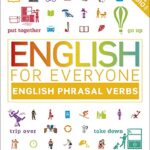Common English phrasal verbs. English grammar with exercises. Free eBook and Free printable PDF.
Common English phrasal verbs

Common English phrasal verbs
Phrasal verbs are two or more words that together act as a completely new word, with a meaning separate from the original words. For example, pick up means to “grab” or “lift,” very different from the definitions of pick and up alone. Popular in spoken English, phrasal verbs can be quite confusing because their definitions aren’t always easy to guess—and there are thousands of them. In fact, many phrasal verbs are distinct variations on the same base verb, which can add to the confusion.
What is a phrasal verb?
A phrasal verb combines a normal verb with an adverb or a preposition to create an entirely new verbal phrase—the phrasal verb. The meaning of a phrasal verb is usually unrelated to the meanings of the words that comprise it, so think of a phrasal verb as an entirely new and independent word.

Exercises
Common English phrasal verbs
EXERCISE 1.
Complete the sentences with the following phrasal verbs.
bring up face up to get carried away go through
- The police ordered the outlaw to ________________ the gun.
- After his wife died he had to ________________ the fact that he had to live on his own.
- My father ________________ by his grandmother.
- She is amazingly cheerful considering what she’s had to ________________.
- I had to come back from my holiday because I ______________ money.
- We must _________________ if we want to buy a house.
- The book I’m reading is very good. I _______________ by the story and I read till four o’clock in the morning.
- If you observe this picture very carefully you will be able ____________ two different faces.
- How __________ you ____________ your new job?
- In the end that tramp ___________ to be a very famous journalist who was carrying out a research on the condition of homeless people.
- I don’t know what he will do, I’m not a witch and I can’t _________________ the future.
- Our American friends couldn’t find a hotel so we decided to _________ them ______ until they found a place to stay.
- The teacher asked to ______________ the exercises once again before handing them back.
- That man was very rude. He _____________ the receiver without even saying goodbye.
- Our holiday was wonderful even if we had to __________________ some weird situations, once we ________________________ petrol and our car stopped in the middle of nowhere, no petrol station in sight and no one else around.
EXERCISE 2.
Match the phrasal verbs to the correct definition.
| Call into | Pay a visit |
| Get over | Cancel |
| Run out | Increase |
| Look for | Look like |
| Take after | Search |
| Give up | Finished/empty |
| Drop by | Stop |
| Call off | Recover |
| Go up | Decrease |
| Come down | Pay a visit |
EXERCISE 3.
Now using the phrasal verbs from the list above complete the following sentences.
Example:
He was looking for the right words to make her understand.
- If you don’t _______________smoking you will get ill.
- It took him a long time to _____________the death of his wife.
- He is _______________ her address because he wants to send her a card.
- Tom can’t start his car, the battery has ___________.
- The baby ________________his father. He has dark hair and blue eyes.
- On my way home I ______________ the florists and bought some flowers.
- We’ve ____________ of bread. Can we borrow some?
- _____________ anytime you’re passing for coffee.
- The meeting was ___________________.
- Inflation always ______________ and never ______________.
EXERCISE 4.
Re-write the following sentences using the words given.
e.g. An unexpected problem emerged……………………………………………………………………come up.
An unexpected problem came up.
- The thief has never been punished………………………………………………………………away with
- Sarah went to the cinema and Paul went with her……………………………………………. along
- The romance has ended ……………………….…………………………………………………………………..over
- Even though I didn’t mean it, I said something really tactless………………………..foot
- She was happy when Andrew left because she couldn’t stand him……………………saw
- 6. I found his joke really funny but I didn’t laugh…………………………………………………..kept
EXERCISE 5.
Complete the following sentences using one of the following phrasal verbs.
to hunt down – to pack up – to shack up (with s/body) – to come across – to blow s/thing up – to drink up – to hang up – to pin s/thing/body down – to run away with – to rake s/thing up – to bring s/thing up – to check out – to fall for s/thing/body – to go on about s/thing – to pick s/thing/body up – to sit on/upon s/thing – to stumble on/upon/across
- It was such a small problem at first. Now it ______________ into something enormous.
- At the end of the conversation I _______________ the phone.
- My plant hasn’t been watered for days. I’m sure that as soon as I water it, it __________________ all the water ______________.
- The robbers ______________ by the police for over a week.
- I told John a few white lies regarding where I had been and he _________ it.
- I ___________________ anybody so rude in all my life.
- Have you heard the news? Sarah and Andrew ____________ together!
- They are renting a house near the station.
- She was looking for her old school books, when she ____________ some school photos.
- Shall we __________________ the question of summer holidays at the next meeting?
- On my last day of work, I will have to _______________ all my belongings.
- I don’t like going out with Mary. She always _____________ your past.
- I’d rather _______________ this problem for the moment. I need time to think about it.
- Can you ___________ the tickets __________ on the way home from work?
- Hilary never stops talking about her work problems. She _______________ _________ for hours.
- I couldn’t quite _________________ what I thought about Jessica.
- Don’t let your imagination _______________ you. Get the facts first.
- We have to ________________ of the hotel before 11.00am.
EXERCISE 6.
Match the following phrasal verbs with their meanings.
- 1. to be/get mixed up in/with something a. to quit
- 2. to call somebody in b. to postpone
- 3. to come up with c. to be occupied/busy with
- 4. to go round d. to be involved in/with
- 5. to drop by e. to clean/clear/push away
- 6. to drop out of f. to be implying/trying to say
- 7. to go through g. to hold tightly
- 8. to build up h. to produce/find
- 9. to face up to something i. to visit unexpectedly
- 10. to get rid of something/body j. to accumulate/form a block
- 11. to hang on to something k. to send for somebody to come to the house to perform a service
- 12. to put something off l. to experience
- 13. to sweep away m. to become free of
- 14. to be up to something n. to examine details of/look at
- 15. to get at something o. to recognise and deal with,
- honestly and bravely
- 16. to go over something p. to reach a destination by using a route other than the usual or shortest way
EXERCISE 7.
Using some of the above phrasal verbs, complete the following sentences.
- What _____________ you ______ _____ ? I’m just filing the letters.
- Did you ___________ __________ ___________ a solution to that problem you were telling me about?
- I haven’t been to see you for ages. Can I ________ _________ at the weekend?
- The tension at work _______ ________ _________ _________ for months now and I think the boss is about to explode.
- Due to the bad weather, today’s football match ________ __________ ____________ until next Tuesday.
EXERCISE 8.
Replace the existing verbs in the sentence with the correct phrasal verb from the following list.
to wipe off – to wipe out – to go ahead – to be through with – to get stuck with somebody or something – to lay oneself open to something – to get through
e.g. The writing on the wall had been wiped off before the Pope’s motorcade came past.
- The opposing forces will be totally eliminated during the political campaign.
- The plan to destroy his political opponents by any means possible proceeded with machine–like efficiency.
- At a very young age the now rich business man decided that he had had enough of the moral rigor imposed on him by his Jesuit teachers.
- For the moment, the young and ambitious businessman had to admit that he was forced to work with his older and more scrupulous partner
- He exposed himself to great risk in order to save his father from disgrace.
- He wouldn’t listen, it was impossible to reason with him.
- If he could avoid any extra duty, he would.
- Although the tycoon put on a democratic appearance, anyone who knew him personally knew that he favoured fascism.
- He noted the phone number in his agenda.
EXERCISE 9.
A. Match the following phrasal verbs on the left with the appropriate meaning on the right:
Hold on to sth a. Receive something unpleasant
Catch up with sb b. Agree with
Look down on sb c. Reach somebody who is ahead
Send off for sth d. Begin to do/give serious attention
Come in for sth e. Continue doing
Walk out on sb f. Ask to be sent something by mail
Get down to g. Keep something/not give away
Carry on with sth h. End/abolish
Do away with sth/sb i. Think you are better than others
Go along with sth/sb j. Suddenly leave someone you are having a relationship with
EXERCISE 10.
Fill in the space with the phrases below and put them in the correct tense, if necessary.
be left stranded – cross one’s mind – come to terms (with) – come straight to the point – have a go – start off
e. g. You’ve already tried. Let me have a go.
- We had such a hard time. I’d never ________________ so difficult a situation as that.
- He’s not very clear. He never ___________________
- I’m sorry. I didn’t think. It ______________________
- I had no money, no passport and no friends. I ___________
- The project _________________________ well but met some difficulties later on.
- The situation is incredible. It’s ____________________
- The opposing sides _______________________ after an all-night negotiating session.
- I don’t know if I can do it but I ____________________
EXERCISE 11.
Complete the sentences by writing the correct tense of the correct phrasal verb in the spaces. Remember that sometimes there is more than one meaning for a phrasal verb!
to dream up / to rule something out / to stand out / to sum up / to turn away / to be tied up / to set somebody up / to come out with / to knock somebody out / to let oneself in for something / to come over / to make up / to take off /
to tie something upe.g. Well, that’s that investigation over, we’ve managed to tie up all the loose ends in the case and the criminal is behind bars. Well done everyone!
Oh, look at that poor dog! He’s been tied up for hours outside that shop.
- I overheard Janice speaking to Simon the other day. It sounds as though the doctors have decided that they’re not too old to have children, since she said they shouldn’t___________ having children yet.
- That blackmailing hussy! I can’t believe Graham hasn’t seen through her yet. I really don’t think he knows what _________________ by moving in with her!
- Felicity was looking through the newspaper clippings from the last Olympics, yesterday. Teresa had blurted out about her new boyfriend having been the Olympic Swimming Champion, and after she ____________________ it, Felicity went straight to check, and of course, the twerp had been lying!
- That mischievous kid teased our neighbour’s puppy so much, that it tried to bite him. You should have seen how fast he _____________!
- Sam has just told me about his latest plan to make money. Honestly! The things he ________________ are incredible!
- Do you remember that guy, Christopher from the party the other night? He really gives me the creeps – he’s such a devious, person. He was trying to get Phil’s girlfriend to go out with him, you know. Mind you, she did look absolutely stunning, she really __________him _________.
- Stephanie and Marcus were really having a bad argument last night. You could hear them until 4 a.m. screaming at each other, but they seem to have ___________ now, I saw them hand-in-hand at the market this morning.
- Josephine went for an interview yesterday. Poor thing, the recruitment agent really _______ her _________, the job wasn’t anything like what she was looking for, and she had to spend £50.00 on the train fare, which is non-refundable!
- It’s a shame you didn’t make it to the house-warming party the other evening – I wish you had been able to _____________, it was a really good laugh.
- “…and so, if nobody else has anything to add to this month’s meeting, I’ll just ____________ the main points again so that everyone is clear about our objectives”.
- “Stuart”, she cried, “don’t leave like this!” But he just looked and then ______________ without uttering another word.
- Emma looked fabulous in that Armani dress at the gala dinner. There was no-one else who looked nearly as good as her. She really _____________ from the crowd.
- I’m awfully sorry about not being able to come to dinner tonight, darling, I’m rather ____________ at work still!
EXERCISE 12.
Use the phrasal verbs seen above to complete the phrases below:
(use each phrasal verb once)
e.g. George was kicked out of the bar last night for having drunk too much.
- I’ve ______________ some new books.
- ______________ that painting. One day it will be worth millions.
- It’s about time I ______________studying for my finale exams.
- He thinks it’s time we ______________ the British Monarchy.
- He’s still ______________ his university studies after all these years.
- She ______________ her children when they were really young.
- I don’t ______________her views on abortion.
- Elisabeth ______________ people who haven’t been to university.
- The federal government’s foreign policies have ______________ a lot of criticism.
- The police were finally able to ______________ the criminal at the border.

BROWSE THE EBOOK ONLINE OR DOWNLOAD THE PDF FOR FREE

All downloads are in PDF format





